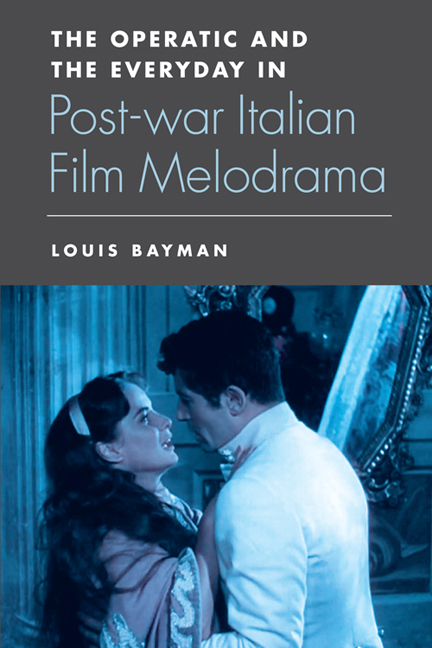Chapter 2
Published online by Cambridge University Press: 05 August 2016
Summary
I MELODRAMA, REALISM, MODERNISM
When choosing the key or representative moments of Italian sound cinema, textbook histories make sure to mention consolatory comedy dominating before the fall of Fascism and then a brief flame of searching, committed neorealism as a response afterwards, settling into a system of arthouse auteurism in the 1950s until crisis hits in the 1970s. These are characterisations which project a particular relationship between culture and society, and have as much to do with how scholarship would like to perceive its own role as anything else. That is, they tell no untruth, but prioritise the separation of art from commerce while attaching popularity to conformity.
It is precisely the work of scholarship to select, shape and define, and it is not the purpose of this chapter to deny that such processes are at work in any appraisal of an epoch's culture, this one included. What I seek to do is add to the more familiar picture of post-war Italian cinema the dynamic of melodrama. Throughout these periods the industry's commercial and productive bases were a genre system aimed at popular tastes, one that provided the material and artistic grounds from which auteurist experimentation took root and one that helped determine the social function of culture.
In the previous section I considered melodrama as a genre, restricted within the period 1949–54. In the longer historical view, melodrama is a response to changed perceptions of selfhood, knowledge, feeling and value wrought by the modern era, and to the consequent crises of older forms of representation. In this it constitutes one of the three forms, along with realism and modernism, that respond to the specific needs of the modern age. As well as comedy, each of these forms is particularly important in Italian cinema (limiting the degree to which one can describe Italian cinema through ideals of classicism). Furthermore, the post-war period was in Italy one in which cinema was the most prominent terrain on which were posed questions of artistic form and purpose. Given the centrality of Italy internationally to the rearticulation of cinema's relationship to reality at this point, to sketch the broader place of melodrama in the post-war period will also be to trace some of the contours of the function of culture itself.
- Type
- Chapter
- Information
- Publisher: Edinburgh University PressPrint publication year: 2014



